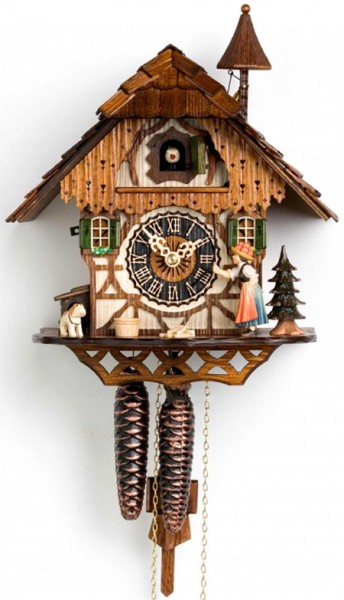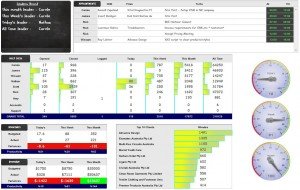
Predictability and Swiss Clocks
How would you like to be able to predict the future in your business?
The holy grail of business is to have a business that behaves like a Swiss clock… Tick Tock… Tick Tock… No surprises… it just works, day in day out. Clients walk in the front door… every day, Tick Tock… the products or services get delivered out the backdoor… every day, Tick Tock… The invoices get sent by the bookkeeper… every day, Tick Tock… and the money drops into the bank… every day, Tick Tock, Tick Tock.
Is that your dream too? Do you dream of Swiss clocks?
Fun Businesses Have Rhythm
A Fun business that sustains you for years to come has rhythm, because with rhythm comes predictability and that’s precisely what you are looking for: to know with a fair degree of certainty what is going to happen tomorrow, next week and next month means you can plan and prepare and be pro-active.
Think about it… If you knew with a high degree of accuracy how many contracts you’d sign next month, or how much money would come in the door, or how many widgets you’d produce, or how many emergency callouts you’d have or warranty repairs you’d have to carry out… What difference would that make to how you managed your business and how much Fun you’d have in your business?
If you knew for sure that 3 months from now your business would have 25% more work to carry out than you have right now, you can start looking for the right people now and have them ready for the onslaught in time, instead of managing in crisis, madly running around trying to find someone at the last minute and begging everyone to stay back to finish the work… I know what situation I’d rather be in, don’t you?
Two Mechanisms of Business Rhythm
But how can you know all that? Predicting the future is crystal ball gazing, right? The best you’ll ever do is guess, right?
Well no. You can predict the future in business through two mechanisms:
- Measuring
- Meeting
Measuring / Dashboard Management

‘Measuring’ is about taking regular measurements of various systems in your business and looking for trends. I often refer to this aspect of business as “dashboard management” and I have written about the topic extensively in various other places, for example here: https://www.newperspectives.com.au/numbers/ , so I won’t get into further detail about numbers and measurement right now but it is important to know that ‘Meetings’ without ‘Measurement’ are a waste of time… you need both to build predictability into your business.
Meetings
So the second mechanism is about meetings. A business that sustains you for years to come will have a schedule of regular meetings, daily, weekly, monthly, annually. It can be no other way.
The size of the business will determine the number of meetings but an average small business in a single location based around a service, profession or trade with 5 to 15 employees will likely have a 15-minute catch up at the beginning of each day at a team level; a weekly 1-hour production team “Work in Progresss (WIP)” meeting and a weekly company-wide half hour “huddle”. The last two meetings may be expanded into more comprehensive meetings at the start of every month.
Besides these meetings there may be regular sales team meetings and management team meetings, and last but certainly not least, individual progress or performance meetings between managers and their direct reports, ideally no more than monthly but certainly no more than quarterly.
Jamie’s Panel Beating Shop Finds Rhythm

To illustrate what I’m talking about I’ll tell you about a client of mine called Jamie who owns a panel beating and spray painting business and who I worked with a few years ago:
Jamie employed about 18 people and the business ran from brushfire to crisis and back to brushfire most of the time, things used to go wrong and profits tended to get lost in the daily and weekly efforts to fix the things that went wrong.
When Jamie and I started working together we quickly realised that the crises were usually caused by a lack of effective communications throughout the business and a lack of cooperation amongst different sections of the business.
So Jamie started by implementing a weekly staff breakfast on Friday mornings. At those times the business would open a little later than normal and a nice spread was laid out for breakfast and everyone took part. At the breakfast Jamie would facilitate discussion amongst his staff to a set agenda that always included a recap of the week… what went well last week, what didn’t go so well last week… and a plan for the next week to address the question: What can we put in place as simple actions that will help us improve next week.
Jamie was amazed how quickly things started to improve. Literally in weeks, he noticed a drop off in crises and the mood in the shop just totally changed.
At the end of that quarter, Jamie couldn’t believe his eyes when he printed out his profit and loss report that showed an increase in net profit of 20% over the previous quarter. Suspicious about the accuracy of the numbers he decided to wait and see what the next few months looked like and the numbers were just as staggering. After 4 months Jamie also noticed that the backlog had shrunk by 50%.
A couple of years later, Jamie has extended the lessons from those first breakfast meetings and has implemented all kinds of rhythms into the business and together with his increased focus on measuring and systems, Jamie’s business actually does run like a Swiss clock these days… Tick Tock… Tick Tock.
Importance of Staff Meetings

A simple weekly breakfast meeting like the one that Jamie instigated in his panel beating shop has two big benefits. First of all it builds team spirit and motivation. For a team to work well together there has to be a certain level of trust and the better you get to know someone the easier it is to learn to trust them.
Most importantly though, the point of a weekly company-wide meeting such as Jamie’s breakfast is that it allows the team to start to become engaged with the company goals. By sharing what went well last week and what didn’t go so well and what to put in place to get the best possible outcomes for the next week, around the table, everyone starts to understand how they fit in the Big Picture and how their efforts have a direct impact on the company as a whole. I refer to these meetings as Huddles. You often see a sporting team doing a huddle before they get onto the field and it’s designed to get everyone on the same page and pulling in the same direction.
The Huddle
Wouldn’t you want your staff to operate like a focused sporting team as well?
A system of formal, regular, structured meeting is an absolute pre-requisite for building a Fun Business that sustains you for years to come… I promise you… Tick Tock… Tick Tock.
All about the 11 most important strategies for growing your business
